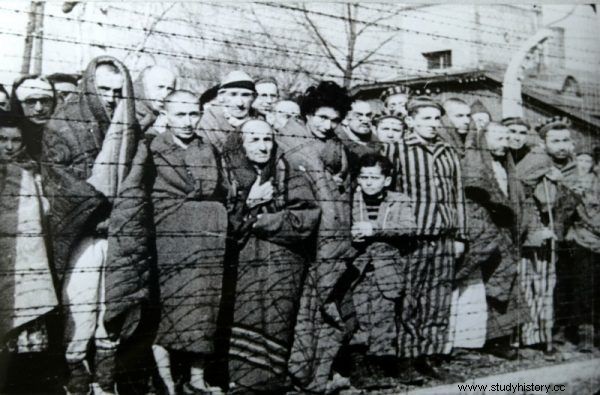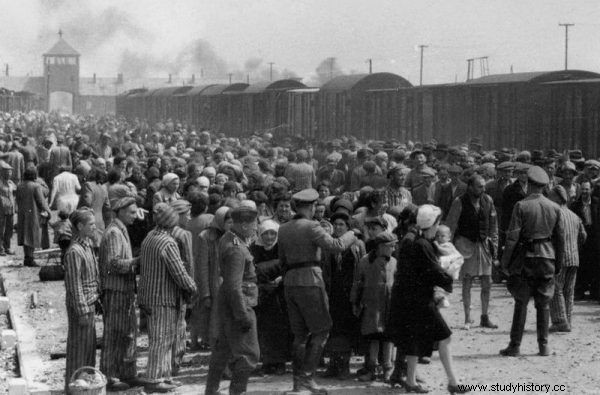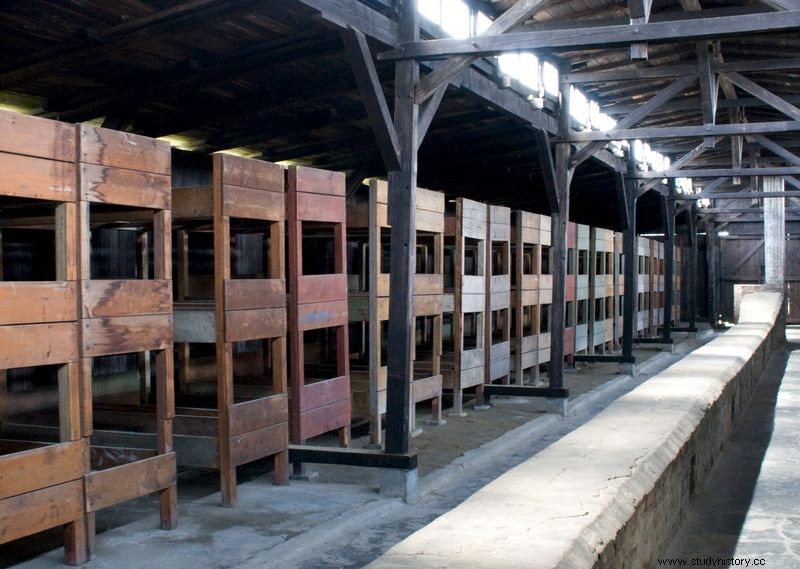How was it possible to survive the extermination camp? Survivors often indicated the appropriate character traits of the prisoner, his health and physical fitness. Fate could also be determined by the whim of fortune. Happiness, however, could be helped - in the hell behind the barbed wire, human life had a price.
Whoever has food in the camp has the strength - recalled Tadeusz Borowski in the short story "U nas w Auschwitzu". All prisoners, judging by trace rations, were doomed to slow death by starvation. Of course, if they were not knocked out by exhaustion of the organism, disease or a whim of an SS-man-sadist.
Lusty coffee for breakfast, watery soup with potato shells for lunch, a few slices of bread, a piece of margarine and sausage for dinner - with such portions it is natural that every prisoner who wants to survive had to organize food on his own.
A wild desire to stay afloat, that is to satisfy hunger as well, gave birth to trade. It means:I will do something for you, but for a slice of bread - recalled Władysław Bartoszewski. - Besides, heavy smokers gave up food for cigarettes and finished off within a few weeks. Due to transformation.
Camp money
Cigarettes were an unofficial currency. In many camps there were canteens where prisoners could buy nicotine products with the money sent to them. Items and clothes were also traded. What was the conversion rate?

The chances of surviving in Auschwitz increased if you listened to prisoners with longer experience. The photo shows the prisoners of the camp liberated by the Red Army in January 1945 (source:public domain).
One Pole left his woolen striped uniform. I arranged it when no one was watched . "To organize" means to steal in a camp. Prisoners must do this to survive - we read in the fictional novel "Chess with Death". Although the novel is based on a fictional story, it accurately reflects the realities of the camp.
- What did you do with it? - asks Emil.
- I sold a block of sixteen. For two rations of bread.
- It's a fair price.
The smoked woolen striped uniform could therefore save or extend the prisoner's life.
Luxury in Canada
Where were the various items and artifacts taken that could be thrown onto the camp market? The place of desire of many prisoners was the so-called "Canada". It was there that all items and goods found in the transported prisoners were collected.
The work unloading the carriages was ungrateful - sometimes the corpses of infants poured out from inside, and Dantesque scenes were played around the train, when future prisoners, still unaware of anything, were given their first lesson in humiliation.
There were, however, tangible profits - the prisoners used the food they brought in handfuls.
Borowski recalled how he and his fellow prisoners enjoyed the taste of dried tomatoes. The guards often turned a blind eye to this practice. The principle that we learn in another short story by Borowski, Ladies and Gentlemen, was simple. "Whoever takes the gold or anything else that cannot be eaten will be shot as a thief of Reich property!"
Another transport gave some prisoners a chance to survive, and others the opportunity to pursue their interests.

In order to have a chance of survival, in the first days of staying in the camp, it was necessary to develop a "sixth sense that detects a threat". The photo shows the selection of newly arrived prisoners to the Birkenau camp (source:public domain).
The camp will live on this transport for a few days, eating its ham and sausages, preserves and fruit, drinking its vodka and liqueurs , he will wear his underwear, trade in his gold and money - Borowski recalled.
A salutary profession in hand
Better work also gave me a chance to get food. Here, privileged were professionals - hairdressers, shoemakers, watchmakers, cooks, who received food or cigarettes for the appropriate service.
Members of the camp orchestra and boxers were also doing better - at least since the camps started to organize regular fights (we wrote more about this in our other article) . The extra portions of food provided a wider range of options in the informal camp market.
Lepsi - block, supervisor, block writer, capos and block barber - Stanisław Grzesiuk, the author of "Five Years of Kacet", recalled. - Those mentioned here took for themselves as many bowls of soup as they needed. Some people could buy this soup with the evening portions of sausage or margarine.
Services for survival
Many prisoners had to make a tragic compromise:humiliating work and degrading services provided a chance of survival and better living conditions. In the camps, for example, there were so-called puffs, or brothels, in short.
The women worked there under precisely defined conditions, they were obliged to serve the appropriate number of clients a day (usually three to four). In return, their everyday life seemed to be better than that of the rest of the prisoners.
Many of Julia have a constant admirer and next to assurances about eternal love, about a happy life together after the camp, you can hear more specific data on soap, perfume, silk panties and cigarettes - describes Borowski.

Prisoners lived in such Spartan conditions. No wonder then that good organization was the basis for survival in Auschwitz-Birkenau (photo:Ealdgyth; license CC BY-SA 3.0).
There is also little mention of young boys who were cared for by the so-called camp prominents. Stanisław Grzesiuk wrote that as a result of this care they were nicely dressed, always well nourished and dedicated to light work. In return, they provided influential caregivers with sexual pleasures. That was also the cost of surviving in the death camp.
Corruption brings hope
Although it has been written many times about the outright obsessive attachment of the Germans to order, many prisoners would not have survived the camp hell had it not been for the omnipresent corruption. Everyone could be corrupted - from commanders, through SS men, to subordinate kapos. The rates varied.
The novel "Chess with Death" cites the story of a group of prisoners for whom the only chance of survival was to spend a few days in the hospital. One pack of cigarettes - that was enough to dispel the doubts of the camp doctor.
A similar stake - in real life - probably saved the life of Grzesiuk's friend Stefan.
Stefan once chased some food with a marmalade pail into the SS garden. The gardener's kapo caught him. He didn't hit him, but just wrote down the number and picked up the tomatoes - we read in "Five Years of a Kacet". - Kapo knew what he was doing. There was cigarette dispensing that day. In the evening Stefan gave him 10 cigars and the kapo destroyed the piece of paper with the number written on it.
Highest bid - buyout
But human life could have come at a much greater cost. In this case, it was no longer about avoiding punishment, getting another batch of food or surviving the day in the camp.
Exemptions from Auschwitz were rare, mainly in the first years of the camp's existence, but they did happen. This is even mentioned in Pilecki's Reports.
There was a minimum percentage of those exempted from Auschwitz. They were mostly colleagues from the Warsaw round-ups, whose families bought them for money, through various intermediaries, often encountering blackmailers and charlatans. Or also families who had their own walks in consulates of foreign countries, and even on Aleja Szucha.
Władysław Bartoszewski was released from the camp, among others as well as the theater director Leon Schiller. In the case of the latter, there is a specific rate of PLN 12,000 that was paid by his sister.
The practice was effective on the one hand and risky on the other. There were a lot of troublemakers and petty crooks around the families trying to extort money. In addition, submitting a corruption proposal to the wrong people could result in draconian penalties. It was a time of war. The man was constantly walking on a very fine line. And more than once he was forced to exceed it.
